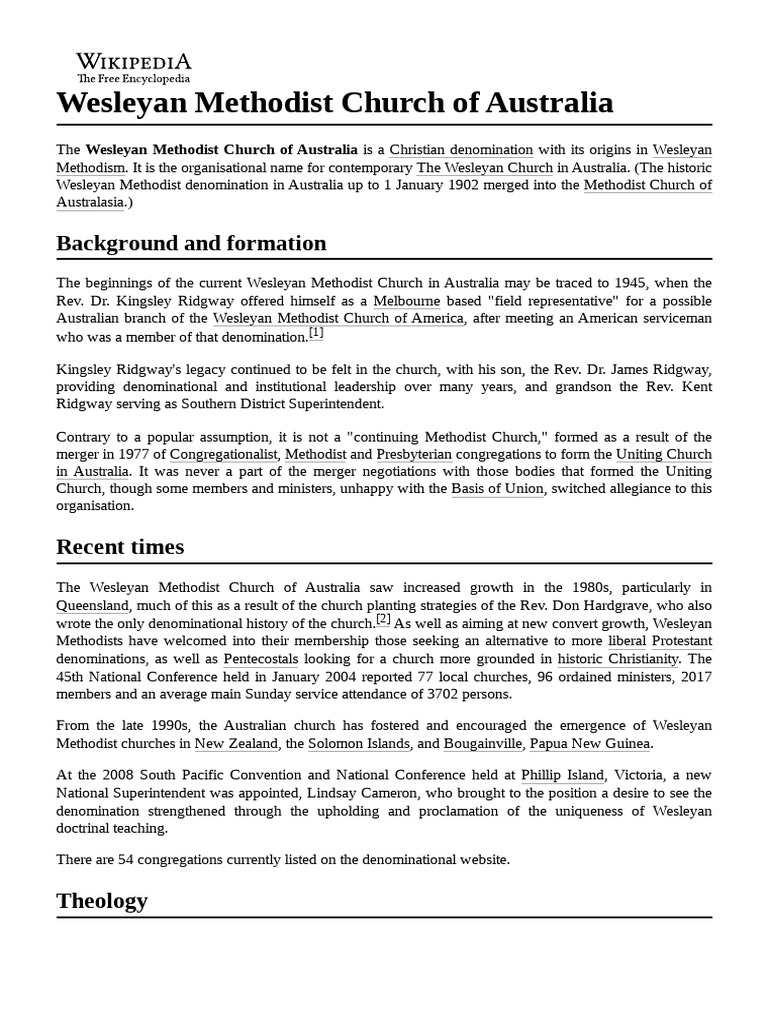The Methodist religion, steeped in rich history and profound theological insights, invites both the curious and the committed to explore its tenets and practices. But what, precisely, is the essence of Methodism? Could it be that, in our contemporary discourse, we sometimes overlook its foundational principles in light of modern interpretations? This inquiry leads us to a deeper examination of Wesleyan beliefs and their relevance in the wider Christian context.
Historically, Methodism emerged in the 18th century as part of the broader Anglican tradition. Founded by John Wesley, alongside his brother Charles, the movement sought to address both spiritual and social issues of the time. The term “Methodist” itself was initially coined as a pejorative, referring to the organized methods Wesley and his followers employed in their faith practices. However, what began as a critique has since transformed into a defining characteristic of the faith — a structured approach to living out the Christian experience.
At the heart of Wesleyan belief is a robust understanding of grace. Methodists hold that grace is a divine enablement bestowed upon humanity, serving as the bedrock for salvation. This concept is pivotal; Wesley articulated a doctrine of “prevenient grace,” which asserts that God’s grace precedes individual conscious decisions to seek Him. In contrast to deterministic views that suggest salvation is predestined for a select few, Methodism champions the idea that all individuals have the opportunity to respond to God’s call. The dynamic interplay between divine grace and human choice is a thematic linchpin, inviting believers to participate actively in their spiritual journey.
But what about the role of faith in this intricate dance? Wesley’s theology emphasizes that faith is not merely intellectual assent; rather, it is a living, transformative force that shapes one’s entire being. The Wesleyan understanding of justification is often articulated as an experience of inner transformation. This denotes that genuine faith results in a profound alteration in the believer’s life, evidenced by love and good works. Therefore, one might ask: if faith leads to transformation, does this imply that merely identifying as Christian is insufficient without the accompanying evidence of genuine change?
Furthermore, Methodism places a distinct emphasis on sanctification, which refers to the process of becoming holy or set apart for God’s purposes. Wesley coined the term “entire sanctification” to describe a state where believers strive for perfection in love. This doesn’t suggest an unattainable ideal, but rather a lifelong pursuit of spiritual maturity. The call to be morally upright and socially responsible resonates through Wesleyan teachings, urging individuals to reflect the love of Christ in tangible ways. Would it not be a worthwhile challenge for modern believers to examine whether they, too, are engaged in this sacred pursuit of holiness?
Equally significant is the Methodist commitment to social justice and community engagement. Wesley himself was an advocate for the poor and marginalized, emphasizing that faith cannot be divorced from action. The strong connection between personal piety and social responsibility is foundational, encouraging Methodists to confront societal inequities. How often do believers today grapple with reconciling their faith with the pressing social issues of our time? The call to be active participants in societal reform remains a refreshing challenge for churches and individuals alike.
In terms of worship and community life, Methodism is characterized by a rich liturgical heritage interwoven with contemporary expressions of faith. Worship services often include a blend of traditional hymns, many penned by Charles Wesley, and modern musical elements, fostering an inclusive environment for diverse congregations. This adaptability reflects the iterative nature of Methodism, emphasizing that the Church must remain relevant while upholding its core doctrines. Congregational participation plays a vital role; thus, one might ponder: in our quest for authenticity in worship, are we allowing diverse voices to resonate within our congregational lifeblood?
The sacraments of baptism and communion hold paramount importance within the Methodist tradition. Baptism signifies an entry into the faith community, regardless of age, while communion (or the Eucharist) is celebrated frequently, symbolizing community and the ongoing relationship between believers and Christ. These sacraments are not mere rituals; they are profound means of grace that nourish the faith of Methodists. The frequency of communion invites reflection: does a regular encounter with this sacrament deepen our understanding of grace and community?
In conclusion, the Methodist religion presents a compelling framework for understanding the Christian faith. Through its emphasis on grace, faith, sanctification, social responsibility, worship, and community, Methodism offers a holistic approach to spiritual life. The interplay of personal transformation and communal engagement underscores the call for believers to actively participate in their faith journey. As one contemplates the Wesleyan ideals, the inquiry remains: are we truly embodying the essence of Methodism in our lives today? This question invites ongoing reflection and action, urging each individual to consider their role within the tapestry of faith.



